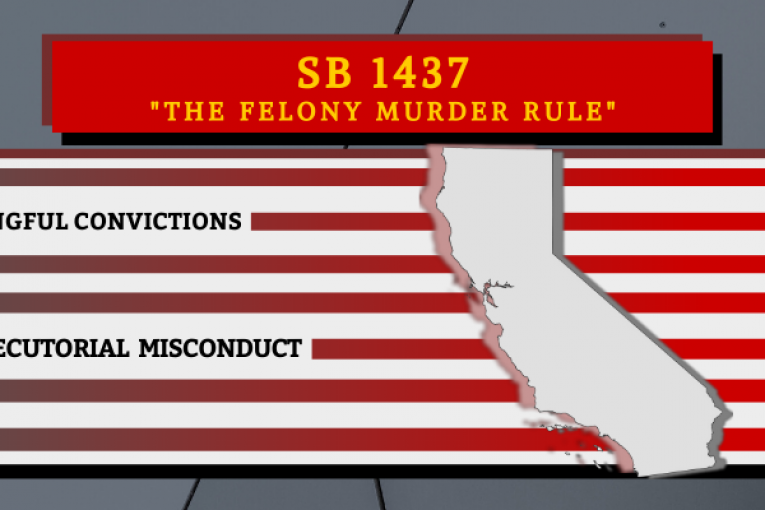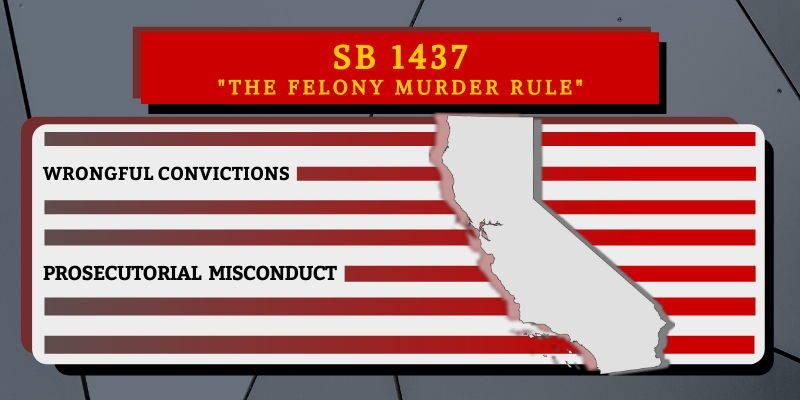
Davidson Case Will Be Heard by the 3rd District Appellate Court
In the month since the 4th District Court of Appeals ruled in both Good and Lamoureux that SB 1437 is constitutional, we have seen in many counties, acknowledgment by the judge that SB 1437 is currently constitutional and an indication, at least by some DA’s of an intention to writ the decision and allow the appellate court and perhaps ultimately the state supreme court to decide the law’s constitutionality.
The case to what in the 3rd Appellate District is the Davidson case. The Harvest Cycle Davidson v. El Dorado County case features two separate questions: the constitutionality of SB 1437 and whether Mr. Davidson was a major participant in a 2016 robbery and thus acted in reckless indifference to human life.
The Attorney General’s Office takes the position that SB 1437 is constitutional but that SB 1437 does not apply in this case because Mr. Davidson played a key role in the underlying robbery.
Vern Pierson, the El Dorado County DA has filed an Amicus Curiae in this case, as the AG has conceded the constitutionality, and Mr. Pierson in his filing argues, “This concession by the Attorney General leaves this Court without the benefit of a countervailing argument in support of the El Dorado Superior Court’s ruling that S.B. 1437 is unconstitutional.”
Mr. Pierson, a staunch opponent of SB 1437 argues that it is unconstitutional because “It unlawfully narrows and shortens long-standing murder sentencing laws that the people overwhelmingly voted to broaden and lengthen. It amends laws passed by the people in Proposition 7… despite the fact that no authority was reserved for the Legislature to make amendments to Prop. 7.”
He further argues that SB 1437, “amends laws passed by the people in Proposition 115 despite failing to meet the two-thirds vote requirement to amend expressed in that initiative.”
Mr. Pierson is a staunch opponent of SB 1437. Last year, he wrote an op-ed in the Mountain Democrat that SB 1437 is v=001uV3jnccU8bbDWqR4notdIozxYnkzDf5t4swt_xn2fn81oeJpaW4eSMCLTEsehMWu2CAfEhWB-zTXOE625hvguJDtqlV4e71IzNKus3gBkN8%3D”> “dangerous new legislation designed to severely limit and restrict the applicability of the Felony Murder Rule.”
“dangerous new legislation designed to severely limit and restrict the applicability of the Felony Murder Rule.”
He also joined with 41 other DAs to sign a letter from the California District Attorneys Association urging Governor Brown to veto SB 1437.
The AG’s office differs here. They argue that Prop 7 “set the penalties for murder,” rather than “the elements of the crime.”
Meanwhile, Prop. 115, the AG argues, “added to the list of predicate crimes supporting a charge of first degree felony murder and the punishments for felony first degree murder.”
Meanwhile, SB 1437 “changed the culpability required to convict for felony-murder and the ‘natural and probable consequences’ doctrine.”
The felony-murder rule, as it existed before 2019, made “a killing while committing certain felonies murder without the necessity of further examining the defendant’s mental state.”
In addition, the court pointed out that the “natural and probable consequences” doctrine, as it existed before 2019, made “a person who aids and abets a confederate in the commission of a criminal act . . . liable not only for that crime (the target crime), but also for any other offense (nontarget crime)”—including murder—“committed by the confederate as a ‘natural and probable consequence’ of the crime originally aided and abetted.”
In passing SB 1437 in 2018, the legislature and government pointed out that “[r]eform is needed in California to limit convictions and subsequent sentencing so that the law of California fairly addresses the culpability of the individual.”
The new law was designed “to ensure that murder liability is not imposed on a person who is not the actual killer, did not act with the intent to kill, or was not a major participant in the underlying felony who acted with reckless disregard for human life.”
The AG therefore notes that this “narrows the felony murder rule” as well as the “natural and probable consequences” doctrine.
They can only be used when the participant in the underlying felony “is the actual killer” or “is not the actual killer but, with intent to kill, aids or abets a first degree murder” or “is a major participant in the underlying felony and acts with reckless indifference to human life.”
As such, the AG Office argues that SB 1437 does not amend Prop. 7. They argue instead, “S.B. 1437 changed the elements that must be proven to convict for the crime of murder, not the penalties upon conviction.”
Further, they argue that SB 1437 “did not restrict the Legislature’s authority to change the culpability requirement to convict for murder.” Therefore, in their opinion, “S.B. 1437 thus did not amend Proposition 115.”
In both Gooden and Lamoureux, the 4th DCA largely adopted the attorney general’s position on SB 1437. If the 3rd follows suit, likely these cases would be heard by the State Supreme Court, if that court takes up the issue. Disagreement by the 3rd, could mean that local jurisdictions will once again rule SB 1437 unconstitutional, or wait until they get clarification from the high court before proceeding.
There is the secondary issue in this case – the culpability of Mr. Davidson for the murder. For her part, attorney Jennifer Mouzis, representing Mr. Davidson does not believe he took part in the murder.
In a relatively recent case, Mr. Davidson was part of a group of people that met with the victim Dennis Wright and his girlfriend, Kyndra Ghiorso on January 16, 2016. They set up a marijuana deal.
They had a dispute over the sale of the marijuana. Mr. Wright had brought three large duffel bags of marijuana from his truck, but the buyer decided not to make the purchase. So the marijuana was put back into his truck.
At this point, “two assailants approached Wright, and demanded the tote bag Wright had in his hands at the time. Wright refused, and the assailants grabbed him, pushing Wright toward the parking lot.”
There were several gunshots, Mr. Wright fell to the ground.
According to the evidence, Mr. Davidson was with the alleged killers as well as the accomplices, but he did not take part in the killing. Instead, he was in a car parked away from the hotel at the time of the shooting.
Under the old felony murder rule, all they had to show was that Mr. Davidson had taken part in the robbery – to be convicted of the robbery, he would also be convicted of the murder. But if SB 1437 is upheld, they will have to show that he acted in reckless disregard to human life.
In her filing, Ms. Mouzis argues, petitioner was not a “major participant who acted with reckless indifference to life.”
It is here where Ms. Mouzis disagrees with the AG’s office.
The AG writes, “Davidson contends that he cannot be liable for murder because there was insufficient evidence presented at preliminary hearing that he was a major participant in the underlying felony and acted with reckless indifference to human life.”
They claim this argument has no merit. They argue that there “was sufficient evidence to establish probable cause to believe that Davidson was a major participant in the underlying felony.”
They note: “Here, the testimony presented at preliminary hearing would lead a person of ordinary prudence to “conscientiously entertain a strong suspicion” that Davidson was a major participant in the underlying felony that resulted in Wright’s death and acted with a reckless indifference to human life. Unlike the defendant in Banks, the evidence showed that Davidson was far more than just a getaway driver.”
For instance, they note that Mr. Davidson may have identified Mr. Wright “as the person they should rob.” If that happened, they write, “it was Davidson— in essence—who enabled the robbery to take place. Without his participation, Vaccaro and Randolph would not have known to target Wright and would have been faced with the prospect of trying to rob the entire group in the room at Beverly Lodge, an untenable scenario for Vaccaro and Randolph.”
“The testimony presented at the preliminary hearing would lead a person of ordinary prudence to ‘conscientiously entertain a strong suspicion’ that petitioner was a major participant in the underlying felony that resulted in Wright’s death and acted with a reckless indifference to human life,” the AG writes.
A jury would then have to decide whether (A) that inference is proven beyond a reasonable doubt and (B) if true, whether identifying Mr. Wright constitutes a major participant and acting in reckless indifference to human life.
Last August, Ms. Mouzis told the Appeal, “If 1437 is constitutional, the most [Davidson] could ever be found guilty of would be robbery.” She goes a step further, “I’m not even sure he can be found guilty of that. He’s been in custody for so long the only thing justice can look like is letting him go home.”
—David M. Greenwald reporting







